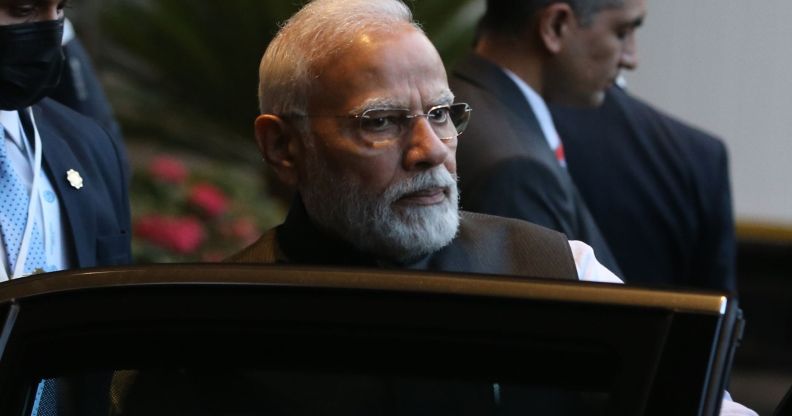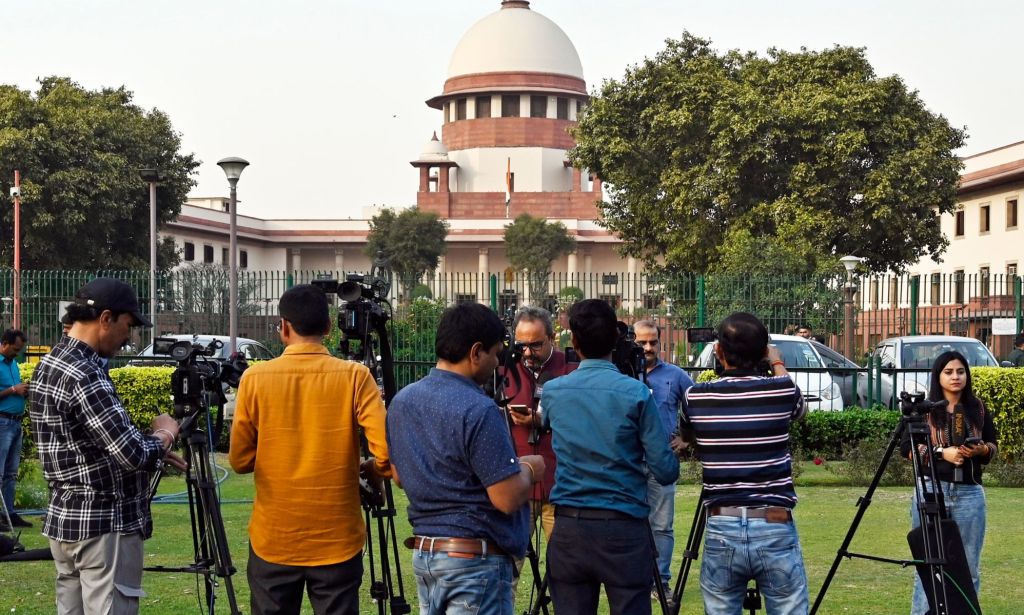Indian government brands same-sex marriage calls ‘elitist’ as historic Supreme Court hearing begins

India’s government, led by prime minister Narendra Modi, opposes attempts to legalise same-sex marriage. (Getty)
India's government, led by prime minister Narendra Modi, opposes attempts to legalise same-sex marriage. (Getty)
The Indian government has condemned same-sex marriage as “elitist” as a historic Supreme Court hearing on its possible legalisation begins.
Prime minister Narendra Modi and fellow members of India’s Hindu nationalist government submitted an affidavit establishing its view on same-sex marriage to the Supreme Court on Monday (17 April).
It comes as the court hears arguments on a series of petitions brought forward by LGBTQ+ couples and activists as part of a collective lawsuit seeking to introduce marriage equality in the country.
In the statement, India’s government described marriage as only being valid between biological males and females, while claiming legalising same-sex marriage “seriously affects the interests of every citizen”.
“This definition is socially, culturally, and legally ingrained into the very idea and concept of marriage and ought not to be disturbed or diluted by judicial interpretation”, the affidavit read.
Additionally, the government statement described demands for same-sex marriage as a “mere urban elitist view for the purpose of social acceptance.”
“Petitions which merely reflect urban elitist views cannot be compared with the appropriate legislature which reflects the views and voices of a far wider spectrum,” it continued.
India’s Supreme Court is to hear final arguments regarding the issue on Thursday (20 April), after dozens of petitions urging for legal protections to be put in place were submitted over the last decade.
The latest set of lawsuits were brought before the court on Tuesday (18 April) as part of a collective effort to battle for LGBTQ+ rights.
A ruling in favour of same-sex marriage would mark another landmark moment for the LGBTQ+ community in India, where same-sex sexual activity was decriminalised in 2018 following a similar Supreme Court case.
Currently, queer couples in India are only permitted to be in “unregistered cohabitations” meaning that they can live together, but aren’t afforded the rights of heterosexual married couples.

India’s chief justice DY Chandrachud described the matter as of “seminal importance” before establishing a five-judge panel that would rule on the case.
As part of the government’s arguments, prime minister Modi not only opposed the hearing itself, but also the recent promotion of a gay lawyer to a position on the Supreme Court.
Additionally, the government attempts to argue that legislation and societal views in India deem marriage to be “exclusively heterogeneous”.
This is despite the fact that, according to data collected by Ipsos in 2021, acceptance of LGBTQ+ couples in India has risen dramatically over the past few years, with only 18 per cent being against same-sex marriage as opposed to the 58 per cent supporting it. Twenty-four per cent said they didn’t know or didn’t answer the question.
Petitioning Delhi couple Kavita Arora and Ankita Khanna were motivated to bring the case due to the practical benefits of marriage that aren’t currently afforded to LGBTQ+ couples.
Currently, the couple would not be able to hold a joint bank account, adopt, own property together, be recognised for inheritance or give each other medical consent.
“As we have grown together, we’ve understood that marriage in our country, in our culture, means a lot of important things,” Arora told The Guardian.
“It means a sense of social recognition, a sense of validation, and legally it sanctions a whole lot of different rights that queer couples are denied.”
Similarly, queer couple Supriyo Chakraborty and Abhay Dange said in March that their own personal liberty was being mitigated by the law.
“If the petitioners, as a same-sex couple, enjoyed access to the civil institution of marriage, they would face no untold practical difficulties, both vis-a-vis each other and their children,” a court plea read.
Legalising same-sex marriage would be an incredibly historic moment, not only for India but for the entire continent of Asia.
To date, Taiwan is the only country in Asia where same-sex marriage is legally recognised.

